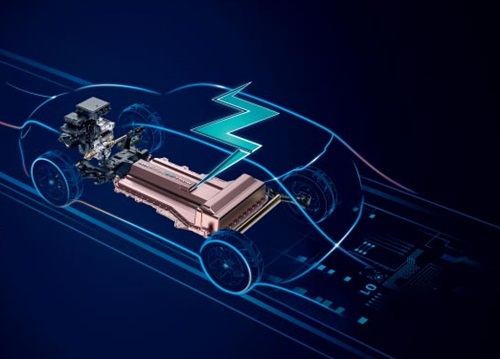
Tata Motors on Thursday unveiled a state-of-the-art electric vehicle technology ‘Ziptron’, which will power a range of aspirational Tata electric cars, starting with a new launch in the fourth quarter of the current financial year.
- The new technology will form the basis of Tata Motors’ future EVs, and with it the auto major will ramp up its presence in the electric vehicle segment. The new technology, branded ‘Ziptron’, will first be used on a model set for launch in early 2020.
- “Ziptron, a soon to be introduced EV powertrain technology, is a building block towards Tata Motors’ consistent strive for commonality, to drive economies of scale and to make new technologies affordable for the Indian consumers. It embodies distinctive characteristics: efficient high voltage system, zippy performance, long range, fast charging capability, battery with warranty of 8 years, and adherence to IP67 standard,” Tata Motors stated in a release.
- Tata Motors says Ziptron has been developed keeping Indian climatic and traffic conditions in mind, and also addresses typical EV buyers' concerns of performance, range and safety.
- While Tata Motors has not revealed final specifications as yet, company spokespersons announced that cars built with Ziptron will have a “minimum range of 250km” and will support fast charging. The battery pack comprises lithium-ion cells and features liquid cooling to maintain the ideal operating temperature. The battery pack comes in a high-strength steel casing and boasts an IP67 rating, assuring highest standards for waterproofing and dust protection. Tata Motors will offer a standard eight-year warranty on the battery pack and motor.
- The high-voltage 300V-plus permanent magnet synchronous electric motor also promises to be leagues ahead of the 72V AC induction-type motor on the Tigor EV in performance and output. The motor will come mated to a single-ratio transmission that has been optimised for Indian traffic. Ziptron cars will also feature drive modes to give drivers the option to maximise range or enhance performance.
- Speaking at the launch, Guenter Butschek, CEO and MD, Tata Motors said the state-of-art technology brand `Ziptron’ has been designed in-house while utilising the group’s global engineering network.
- “At the heart of our future EV line-up, this technology will deliver a thrilling driving experience to our customers aspiring to go-green. Rigorously tested across 1 million kms, Ziptron technology is well proven, advanced and reliable. With this technology, we hope to usher in a new wave of eMobility in India and accelerate faster adoption of EVs, supporting the government’s vision,” he added.
- Connected technology will also be part of the package on Tata’s upcoming electric cars giving buyers remote access to vehicle health, status and location reports.
- Ziptron technology comprises a highly efficient permanent magnet AC motor providing superior performance on demand. It also offers best in industry dust and water proof battery system meeting IP67 standards. Further, Ziptron utilises smart regenerative braking to charge the battery while on the drive, the company stated.
- Along with Ziptron, Tata Motors also rolled out the Ziptron Freedom 2.0 campaign. This campaign aims at highlighting how this technology breaks existing barriers and provides freedom from pollution, addresses range anxiety, and offers electrifying driving performance. Source: https://www.domain-b.com/
